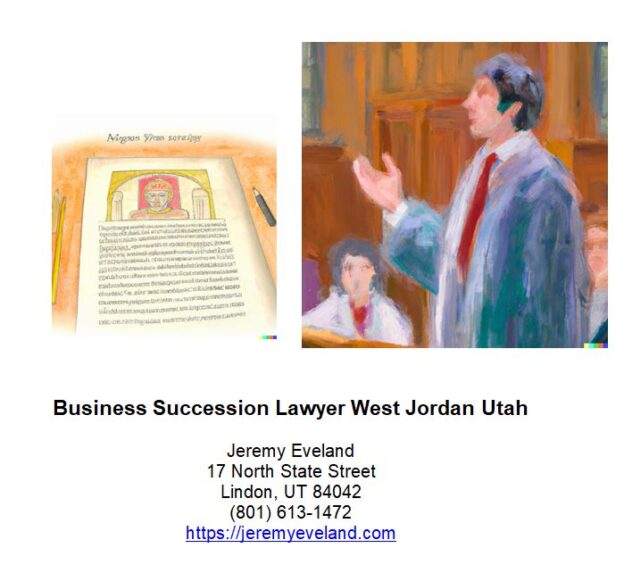Business Succession Law
Business Succession Law is a complex and important area in the legal landscape. It involves planning for the future of a business, from the transfer of ownership and control to the division of assets and liabilities. It is essential for business owners, family members, and other stakeholders to understand the legal rules, regulations, and issues associated with business succession in order to ensure the continuity of the business and the protection of the owners’ interests. Business Succession Law is a subset of Business Law.
Black’s Law Dictionary, Seventh Edition, Page 1162, defines succession as: “The act or right of legally or officially taking over a predecessor’s office, rank, or duties. 2. The acquisition of rights or property by inheritance under the laws of descent and distribution.” (Abridged Edition, West Group, 2000). Succession is also defined in law as “(1) the act or right of legally or officially coming into a predecessor’s office, rank, or functions: (2) the acquiring of an intestate share of an estate; or (3) loosely, the acquiring of property by will.” from Garner’s Dictionary of Legal Usage, Third Edition, p. 859, Oxford University Press (2011). In the common law, Succession is the mode by which one set of persons, members of a corporation agregate, acquire the rights of another set which preceded them. This term in strictness is to be applied only to such corporations. 2 Bla. Com. 430. From page 3176 of Bouvier’s Law Dictionary, Volume 2, L-Z (1914).
So, business succession law is an important area of law that governs the transfer of ownership of businesses from one owner to another. It is important for businesses that are owned by multiple individuals, as it helps to ensure that the business is transferred in accordance with the wishes of the owners. It is also important for businesses that are owned by a single individual, as it helps to ensure that the business is transferred in accordance with the wishes of the deceased owner. Attorney Jeremy Eveland helps business owners in Utah with succession or transfer of ownership of a business either by estate planning, succession planning, or mergers, acquisitions, or direct sales.
Business Succession Planning
The process of business succession planning involves numerous legal issues, such as the transfer of ownership, division of assets and liabilities, and the protection of the business’s interests. Ownership of a business can be transferred to a family member, outside party, or other entity in the form of a buy-sell agreement, estate plan, or other legal arrangement. A buy-sell agreement is a document that outlines the terms and conditions for the purchase and sale of a business, and can be used to transfer ownership of a business to a family member, outside party, or other entity.
Transferring a Business to a Family Member
Transferring a business to a family member is an exit strategy that legally requires a great deal of planning, paperwork, and patience. Before beginning the process, it is important to understand the tax implications, as well as any legal or other considerations that may need to be addressed. For example, if the business is a corporation, it is important to ensure that all shareholders are in agreement with the transfer.
The next step is to draft a legally binding agreement that outlines the terms of the transfer. This should include the value of the business, the method of payment, the responsibilities of the recipient, and any contingencies that may be necessary. It is also important to consider the tax consequences of the transfer, as this may have a significant impact on the financial future of the business and its owners.
Once the agreement is finalized and signed, the transfer can begin. This may involve transferring ownership of the business, transferring assets, and transferring any necessary licenses or permits. It is also important to consider the transition of employees and customers to the new owner.
Finally, it is important to ensure that all of the necessary paperwork is filed with the relevant governing bodies. This may include filing for a new business license or registration, or notifying the IRS of the transfer.
Transferring a business to a family member legally can quickly become a complicated and time consuming process, but it is a viable business exit strategy. It is important to understand the legal and financial considerations involved, as well as to ensure that all paperwork is completed correctly and filed with the relevant governing bodies. With the right preparation and planning, however, the transfer can be completed with minimal disruption to the business and its owners.
Business Succession Lawyer Free Consultation
When you need a business succession attorney, call Jeremy D. Eveland, MBA, JD (801) 613-1472.
Areas We Serve
We serve businesses and business owners for succession planning in the following locations:
Business Succession Lawyer Salt Lake City Utah
Business Succession Lawyer West Jordan Utah
Business Succession Lawyer St. George Utah
Business Succession Lawyer West Valley City Utah
Business Succession Lawyer Provo Utah
Business Succession Lawyer Sandy Utah
Business Succession Lawyer Orem Utah
Business Succession Lawyer Logan Utah
Business Succession Lawyer Lehi Utah
Business Succession Lawyer Murray Utah
Business Succession Lawyer Bountiful Utah
Business Succession Lawyer Eagle Mountain Utah
Estate Planning
Estate planning is also an important part of business succession planning. Estate planning involves the preparation of a will, trust, or other document that outlines the transfer of ownership and control of a business upon its owner’s death. It can also encompass the division of assets, liabilities, and taxes associated with the business. Estate planning can be especially important for family businesses, as it can help ensure that the business will be passed on to the next generation in the manner intended by the senior-generation owners.
The legal needs of business succession planning can be complex, and it is important to consult an experienced attorney to ensure that the process is handled correctly. Attorney Jeremy D. Eveland, MBA, JD, a lawyer based in Utah, focuses his practice in business succession planning and estate planning. We provide legal services to many business owners and families, from estate planning to buy/sell agreements. We use our knowledge and experience to help families and businesses navigate the complexities of business succession law and ensure that their goals for the future of their business are achieved.
Business succession planning involves more than just legal services. It requires careful consideration of many different issues, from the transfer of ownership and control to the division of assets and liabilities. It is important to consider the needs of the business, its employees, and its owners, as well as the future of the business. Attorney Jeremy Eveland understands the nuances of business succession planning, and our attorneys provide comprehensive legal services to ensure that the needs of the business and its owners are met.
What Is Business Law?
Business succession law is a set of laws that govern the transfer of ownership of a business from one owner to another. This type of law is important for businesses that are owned by multiple individuals, as it helps to ensure that the business is transferred in accordance with the wishes of the owners. It is also important for businesses that are owned by a single individual, as it helps to ensure that the business is transferred in accordance with the wishes of the deceased owner.
Business succession law is primarily concerned with wills, intestacy, and the granting of probate. A will is a legal document that sets out the wishes of the deceased owner in regards to the transfer of ownership of the business. If the owner has not left a will, then the laws of intestate succession will apply. Intestate succession is a set of laws that govern the transfer of ownership of a business when the deceased owner did not leave a will. In either case, the court will grant a probate, which is a document that confirms the transfer of ownership of the business.
Alternative dispute resolution (ADR) is another important aspect of business succession law. ADR is a process in which parties attempt to resolve a dispute without going to court. This can include mediation, arbitration, or other forms of negotiation. ADR can be used to resolve disputes over the ownership of a business, as well as disputes over the distribution of assets or the payment of debts.
Business succession law also involves the transfer of ownership of stocks and other publicly traded securities. This includes the transfer of ownership of stock in a publicly traded company, as well as the transfer of ownership of other securities such as bonds and mutual funds. The transfer of ownership of stocks and other securities must be done in accordance with the laws of the jurisdiction in which the securities are traded.
Business succession law also involves the transfer of ownership of life insurance policies. This includes the transfer of ownership of life insurance policies from the deceased owner to the beneficiaries of the policy. The transfer of ownership must be done in accordance with the laws of the jurisdiction in which the policy is issued.
Sometimes, business succession law is concerned with wills, intestacy, the granting of probate, alternative dispute resolution, lawsuits and the transfer of ownership of stocks and other publicly traded securities. This is why your business succession lawyer needs to know about estate planning, estate administration and probate.
In addition to legal services, lawyer Eveland also offers specialized services related to business succession planning, such as: powers of attorney, last wills and testaments, advanced health care directives, revocable living trusts, irrevocable trusts, and more. Our team of experienced attorneys and advisors can help business owners and families evaluate their options and develop a comprehensive succession plan that meets their needs. Our attorneys provide advice on the various options available and help owners and families identify key employees and successors. We also provide guidance on issues such as estate planning, stock ownership, tax planning, and insurance.
We understand the complexities of business succession planning and provide comprehensive legal services to help business owners and families achieve their goals for the future of their business. Our attorneys and advisors are experienced in handling a variety of business succession issues, from the transfer of ownership and control to the division of assets and liabilities, and can provide the advice and guidance needed to ensure the continuity of the business and the protection of the owners’ interests. With our comprehensive services, we can help business owners and families develop a comprehensive business succession plan that meets their needs and ensures a successful transition for the business.
When you need legal help with business succession law in Utah, call attorney Jeremy Eveland for a business succession consultation (801) 613-1472 today.
Utah
From Wikipedia, the free encyclopedia
Jump to navigationJump to search
This article is about the U.S. state. For other uses, see Utah (disambiguation).
Coordinates: 39°N 111°W
Utah
State
State of Utah
Flag of Utah
Flag
Official seal of Utah
Seal
Nickname(s): “Beehive State” (official), “The Mormon State”, “Deseret”
Motto: Industry
Anthem: “Utah…This Is the Place”
Map of the United States with Utah highlighted
Map of the United States with Utah highlighted
Country United States
Before statehood Utah Territory
Admitted to the Union January 4, 1896 (45th)
Capital
(and largest city) Salt Lake City
Largest metro and urban areas Salt Lake City
Government
• Governor Spencer Cox (R)
• Lieutenant Governor Deidre Henderson (R)
Legislature State Legislature
• Upper house State Senate
• Lower house House of Representatives
Judiciary Utah Supreme Court
U.S. senators Mike Lee (R)
Mitt Romney (R)
U.S. House delegation 1: Blake Moore (R)
2: Chris Stewart (R)
3: John Curtis (R)
4: Burgess Owens (R) (list)
Area
• Total 84,899 sq mi (219,887 km2)
• Land 82,144 sq mi (212,761 km2)
• Water 2,755 sq mi (7,136 km2) 3.25%
• Rank 13th
Dimensions
• Length 350 mi (560 km)
• Width 270 mi (435 km)
Elevation 6,100 ft (1,860 m)
Highest elevation (Kings Peak[1][2][a]) 13,534 ft (4,120.3 m)
Lowest elevation (Beaver Dam Wash at Arizona border[2][a][3]) 2,180 ft (664.4 m)
Population (2020)
• Total 3,271,616[4]
• Rank 30th
• Density 36.53/sq mi (14.12/km2)
• Rank 41st
• Median household income $60,365[5]
• Income rank 11th
Demonym Utahn or Utahan[6]
Language
• Official language English
Time zone UTC−07:00 (Mountain)
• Summer (DST) UTC−06:00 (MDT)
USPS abbreviation
UT
ISO 3166 code US-UT
Traditional abbreviation Ut.
Latitude 37° N to 42° N
Longitude 109°3′ W to 114°3′ W
Website utah.gov
Utah state symbols
Flag of Utah.svg
Flag of Utah
Seal of Utah.svg
Living insignia
Bird California gull
Fish Bonneville cutthroat trout[7]
Flower Sego lily
Grass Indian ricegrass
Mammal Rocky Mountain Elk
Reptile Gila monster
Tree Quaking aspen
Inanimate insignia
Dance Square dance
Dinosaur Utahraptor
Firearm Browning M1911
Fossil Allosaurus
Gemstone Topaz
Mineral Copper[7]
Rock Coal[7]
Tartan Utah State Centennial Tartan
State route marker
Utah state route marker
State quarter
Utah quarter dollar coin
Released in 2007
Lists of United States state symbols
Utah (/ˈjuːtɑː/ YOO-tah, /ˈjuːtɔː/ (listen) YOO-taw) is a state in the Mountain West subregion of the Western United States. Utah is a landlocked U.S. state bordered to its east by Colorado, to its northeast by Wyoming, to its north by Idaho, to its south by Arizona, and to its west by Nevada. Utah also touches a corner of New Mexico in the southeast. Of the fifty U.S. states, Utah is the 13th-largest by area; with a population over three million, it is the 30th-most-populous and 11th-least-densely populated. Urban development is mostly concentrated in two areas: the Wasatch Front in the north-central part of the state, which is home to roughly two-thirds of the population and includes the capital city, Salt Lake City; and Washington County in the southwest, with more than 180,000 residents.[8] Most of the western half of Utah lies in the Great Basin.
Utah has been inhabited for thousands of years by various indigenous groups such as the ancient Puebloans, Navajo and Ute. The Spanish were the first Europeans to arrive in the mid-16th century, though the region’s difficult geography and harsh climate made it a peripheral part of New Spain and later Mexico. Even while it was Mexican territory, many of Utah’s earliest settlers were American, particularly Mormons fleeing marginalization and persecution from the United States. Following the Mexican–American War in 1848, the region was annexed by the U.S., becoming part of the Utah Territory, which included what is now Colorado and Nevada. Disputes between the dominant Mormon community and the federal government delayed Utah’s admission as a state; only after the outlawing of polygamy was it admitted in 1896 as the 45th.
People from Utah are known as Utahns.[9] Slightly over half of all Utahns are Mormons, the vast majority of whom are members of the Church of Jesus Christ of Latter-day Saints (LDS Church), which has its world headquarters in Salt Lake City;[10] Utah is the only state where a majority of the population belongs to a single church.[11] The LDS Church greatly influences Utahn culture, politics, and daily life,[12] though since the 1990s the state has become more religiously diverse as well as secular.
Utah has a highly diversified economy, with major sectors including transportation, education, information technology and research, government services, mining, and tourism. Utah has been one of the fastest growing states since 2000,[13] with the 2020 U.S. census confirming the fastest population growth in the nation since 2010. St. George was the fastest-growing metropolitan area in the United States from 2000 to 2005.[14] Utah ranks among the overall best states in metrics such as healthcare, governance, education, and infrastructure.[15] It has the 14th-highest median average income and the least income inequality of any U.S. state. Over time and influenced by climate change, droughts in Utah have been increasing in frequency and severity,[16] putting a further strain on Utah’s water security and impacting the state’s economy.[17]
[geocentric_weather id=”79414f66-9f4c-4a1a-9eaa-8bbae65c0683″]
[geocentric_about id=”79414f66-9f4c-4a1a-9eaa-8bbae65c0683″]
[geocentric_neighborhoods id=”79414f66-9f4c-4a1a-9eaa-8bbae65c0683″]
[geocentric_thingstodo id=”79414f66-9f4c-4a1a-9eaa-8bbae65c0683″]
[geocentric_busstops id=”79414f66-9f4c-4a1a-9eaa-8bbae65c0683″]
[geocentric_mapembed id=”79414f66-9f4c-4a1a-9eaa-8bbae65c0683″]
[geocentric_drivingdirections id=”79414f66-9f4c-4a1a-9eaa-8bbae65c0683″]
[geocentric_reviews id=”79414f66-9f4c-4a1a-9eaa-8bbae65c0683″]





